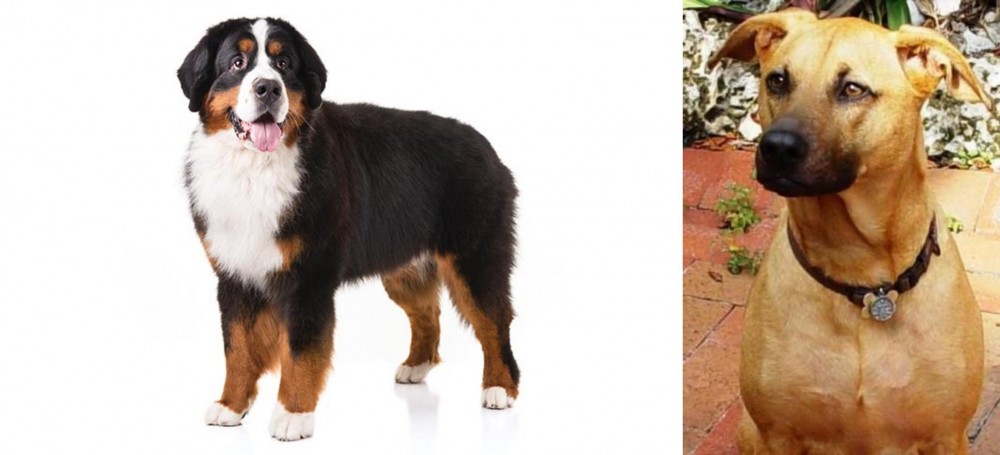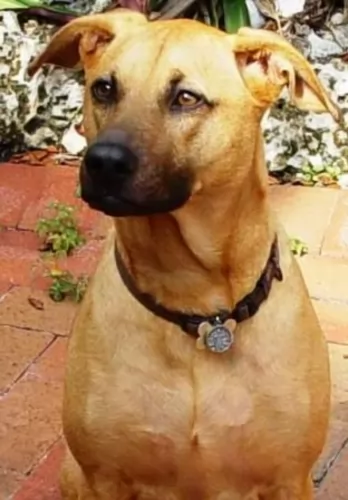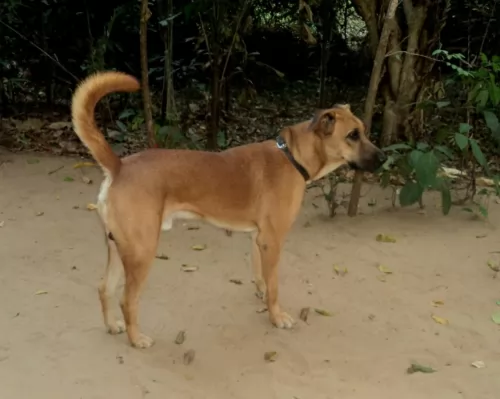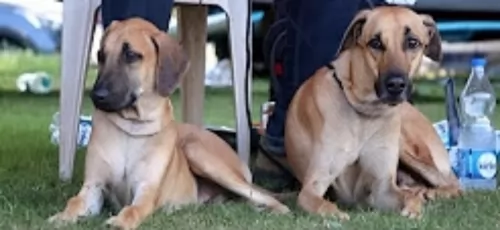 Petzlover
Petzlover Bernese Mountain Dog is originated from Switzerland but Combai is originated from India. Bernese Mountain Dog may grow 7 cm / 3 inches higher than Combai. Bernese Mountain Dog may weigh 21 kg / 47 pounds more than Combai. Bernese Mountain Dog may live 7 years less than Combai. Bernese Mountain Dog may have more litter size than Combai. Bernese Mountain Dog requires Moderate Maintenance. But Combai requires Low Maintenance
Bernese Mountain Dog is originated from Switzerland but Combai is originated from India. Bernese Mountain Dog may grow 7 cm / 3 inches higher than Combai. Bernese Mountain Dog may weigh 21 kg / 47 pounds more than Combai. Bernese Mountain Dog may live 7 years less than Combai. Bernese Mountain Dog may have more litter size than Combai. Bernese Mountain Dog requires Moderate Maintenance. But Combai requires Low Maintenance
 The Bernese Mountain Dog comes from the Swiss Alps and is one of four separate breeds called Sennenhund or “Alpine pasture dog”. The Name Bernese Mountain Dog indicates the area of Switzerland that the dogs come from – the canton of Bern. These groups of dogs accompanied the dairymen and herders and they were farm dogs. They pulled carts, delivered goods from village to village. The Bernese Mountain Dog was part of this group along with: Greater Swiss Mountain Dog, Appenzeller,Entlebucher Mountain Dog and the Bernese Mountain Dog. It is probably true that the Bernese Mountain Dog has been a part of farm life in the Alps for over 2000 years.
The Bernese Mountain Dog comes from the Swiss Alps and is one of four separate breeds called Sennenhund or “Alpine pasture dog”. The Name Bernese Mountain Dog indicates the area of Switzerland that the dogs come from – the canton of Bern. These groups of dogs accompanied the dairymen and herders and they were farm dogs. They pulled carts, delivered goods from village to village. The Bernese Mountain Dog was part of this group along with: Greater Swiss Mountain Dog, Appenzeller,Entlebucher Mountain Dog and the Bernese Mountain Dog. It is probably true that the Bernese Mountain Dog has been a part of farm life in the Alps for over 2000 years.
In some regions of the Alps, these dogs were called Durrbachhund after a small town named Durrbah and are said to be rooted in the Molosser breeds. Tin 1902 the Swiss Kennel Club recognized the Bernese Mountain Dog as a separate breed and the first breed club was founded in 1907 in the region of Burgdorf. The first standard for the breed was written and separated the 4 dogs into their own breeds. The Molosser is an ancient breed whose versatility and travels made it expressly influential in the developing of Mastiff dogs like St. Bernards, Great Pyranees, Mastiffs and Swiss Mountain Dogs like the Bernese.
However at the end of the 19th century famers and shepherds began to import other breeds of working dogs, while at the same time automated modes of transportation began to replace the farm dogs. Under these circumstances the number of Bernese Mountain Dog began to decline and the breed faced potential extinction. A group of people were gathered together to save the Berner, including Franz Schertenleib and Albert Heim. Still today the Bernese are in short supply and because of the need and desire to increase the numbers, some breeding practices have not been as good as they should have been. However, today’s Berner is a great family dog and he still loves to work. He is good at carting, herding, search and rescue, watch dog, tracking, and competitive obedience.
The Bernese Mountain Dog came to the US after World War I and was imported to Britain in the 1930’s. The AKC accepted the Berner as a new Working-Class breed in 1937. It was not until 1968 that the Bernese Mountain Dog Club of America was formed. In 1981, the AKC accepted the club as a member and in 1990 they (AKC) adopted the standard used today to judge the Bernese Mountain Dog.
 The Combai is a dog from Tamilnadu, Southern India, developed to hunt dangerous animals by the Indian royalty. It is a rare breed in India, believed to be close to extinction.
The Combai is a dog from Tamilnadu, Southern India, developed to hunt dangerous animals by the Indian royalty. It is a rare breed in India, believed to be close to extinction.
The dog is also known as the Indian Bear Hound, Indian Bear Dog and Tamil Bear Hound. You can spell the name of the dog with a ‘C’ or a ‘K’, Combai or Kombai.
Accurate records as to the history of this dog haven’t been kept, so much of the dog’s history is on speculation, although it is believed with some certainty, that the breed has been around since the 15th century. It is thought that the Combai was developed from Mastiff-type dogs, Pariah dogs, the Thai Ridgeback and Khoisan dogs.
 The Bernese Mountain Dog is a large, lovable clown. He has a heavy build with a tri color- mostly black – coat. He should have a white chest and rust coloring on the front of his legs, the sides of his mouth, and above his eyes. His eyes should be dark and blue eyes are a disqualification. His coat is silky, thick and long. He has medium sized triangle shaped ears and a scissors bite. He has round toes and strong, straight legs, He is well suited to cold weather. His skull is broad and flat, his muzzle is straight and strong, his nose must be black, and he does not usually drool.
The Bernese Mountain Dog is a large, lovable clown. He has a heavy build with a tri color- mostly black – coat. He should have a white chest and rust coloring on the front of his legs, the sides of his mouth, and above his eyes. His eyes should be dark and blue eyes are a disqualification. His coat is silky, thick and long. He has medium sized triangle shaped ears and a scissors bite. He has round toes and strong, straight legs, He is well suited to cold weather. His skull is broad and flat, his muzzle is straight and strong, his nose must be black, and he does not usually drool.
He is an imposing sight, but he is also as non-aggressive as any breed. He is strong, intelligent, and agile. He should have his dew claws removed. This breed should be self-assured, yet good natured and calm. He is welcoming to strangers and loyal to his people. He needs his people.
 The Combai is a medium sized dog, standing at between 43 to 64cm in height and weighing up to 34kg. Possibly the most distinctive feature of the Combai is a ridge of fur that runs down its back, with the hair growing in the opposite direction to the dog’s body hair. The coat of the dog is short and smooth with colors being brown, tan or reddish. The dog is medium sized, though size does vary quite a bit . The dog is muscular, lean and athletic with a long tail that curls over the back.
The Combai is a medium sized dog, standing at between 43 to 64cm in height and weighing up to 34kg. Possibly the most distinctive feature of the Combai is a ridge of fur that runs down its back, with the hair growing in the opposite direction to the dog’s body hair. The coat of the dog is short and smooth with colors being brown, tan or reddish. The dog is medium sized, though size does vary quite a bit . The dog is muscular, lean and athletic with a long tail that curls over the back.
The head of the Combai is fairly narrow with a muzzle which is quite long.The ears of the Combai vary as well and usually drop down or they fold backwards.
The Combai’s temperament is by no means gentle and it is believed to be a fierce, angry breed who will fight other dogs to the death.
It is sometimes hard to believe that the Combai, with training and socialization can make a good family pet. He then loves the company of his human family and remains loyal to them. When trained and socialized they also get on well with children in the home.
It isn’t recommended as a first dog choice for those who have never owned a dog as it does tend to be aggressive. The dog is also very territorial and alert and its why he makes a good watchdog.
 When reading the AKC standard for the Bernese Mountain Dog you will find that the breed is good natured and self-assured. They are not aggressive, shy or anxious. These are gentle, loving dogs. At the same time, they should be socialized to all kinds of animals, people and children when they are puppies. They are happy outside but need to live in the house with their people. They need exercise and play, and because they are so large, they need this outside. But when it comes to cuddling and sleeping they need to be indoors.
When reading the AKC standard for the Bernese Mountain Dog you will find that the breed is good natured and self-assured. They are not aggressive, shy or anxious. These are gentle, loving dogs. At the same time, they should be socialized to all kinds of animals, people and children when they are puppies. They are happy outside but need to live in the house with their people. They need exercise and play, and because they are so large, they need this outside. But when it comes to cuddling and sleeping they need to be indoors.
They love children though you should be careful with small children because of the Berner’s size and their not being aware of their size at times. They are extremely loyal to their people and want to be with people. They are intelligent, and they want to please their people. At the same time, they are sensitive. They do not respond well to punishment or harshness. They are imposing but they are lovers at heart.
 The Combai is known for its bravery and fearlessness and this is what makes him such an exceptional watch dog as he also doesn’t take kindly to strangers.
The Combai is known for its bravery and fearlessness and this is what makes him such an exceptional watch dog as he also doesn’t take kindly to strangers.
The Combai is full of energy too and won’t like to spend days lying around. He will require regular exercise.
Have him trained and socialized and he becomes the most loyal and devoted pet and companion.
 Even though it is well known that cancer is the leading cause of dog deaths across the globe, the Bernese Mountain Dog is particularly prone to die of cancer. Half of all Berners compared with 27% of all dogs, die from cancer. The Berner’s life span is also shorter than most dogs his size. IT is also not just one cancer that attacks the Bernese Mountain Dog but rather at least 6 or more including mast cell, osteosarcoma, malignant histiocytosis, fibrosarcoma, and lymphosarcoma.
They can also suffer from PRA (Progressive Retinal Atrophy), hypoadrenocorticism, cataracts and histiocytic sarcoma. Another issue that plaques the Berner more than other breeds is musculoskeletal issues that cause mortality. This can include issues such as cruciate ligament rupture, arthritis and hip dysplasia. These types of aliments cause death in 6% of the breed while they are usually the cause of mortality in only 2% of all other dogs.
Even though it is well known that cancer is the leading cause of dog deaths across the globe, the Bernese Mountain Dog is particularly prone to die of cancer. Half of all Berners compared with 27% of all dogs, die from cancer. The Berner’s life span is also shorter than most dogs his size. IT is also not just one cancer that attacks the Bernese Mountain Dog but rather at least 6 or more including mast cell, osteosarcoma, malignant histiocytosis, fibrosarcoma, and lymphosarcoma.
They can also suffer from PRA (Progressive Retinal Atrophy), hypoadrenocorticism, cataracts and histiocytic sarcoma. Another issue that plaques the Berner more than other breeds is musculoskeletal issues that cause mortality. This can include issues such as cruciate ligament rupture, arthritis and hip dysplasia. These types of aliments cause death in 6% of the breed while they are usually the cause of mortality in only 2% of all other dogs.
 Most dog experts will agree that the Combai is a breed that enjoys excellent health, and that in fact it seems as though the dog is disease- and parasite resistant.
Most dog experts will agree that the Combai is a breed that enjoys excellent health, and that in fact it seems as though the dog is disease- and parasite resistant.
There are however, always common dog illnesses that every dog owner should be aware of and it is always to a dog owner’s benefit to have their pet tested by Foundations such as the Orthopedic- and Canine Eye Registration Foundation who can perform tests to identify potential health defects before they show up.
Some of the ailments of concern in hounds include progressive retinal atrophy, demoid sinus and hip dysplasia.
The Retina is the light sensitive part of the eye and also part of the central nervous system. In retinal degeneration, the cells of the retina decline in function and this is what leads to possible blindness.
Progressive retinal atrophy worsens with time. If your pet doesn’t seem to react to light properly it may be wise to have him checked by the vet.
This defect is found in newborns as well as later on in life, and found primarily in Ridgeback dogs. Dermoid sinus is a neural tube defect that is typically found along your dog’s back, the tail and the neck.
The role of the tubes is to drain out dead cells for example. Not correctly formed, they become infected and an abscess forms with discharge. You will have to get your pet to the vet who will proceed with treatment as your pet can experience pain and discomfort.
 As with any large purebred dog, the Bernese Mountain Dog needs high quality food that will provide hi with nutrition and keep him from becoming overweight if fed properly. He is however a very large dog with a very large appetite. Watch his calorie intake. It’s ok to use treats if you fit them into the overall calorie intake for the day. Feed him smaller meals twice a day.
As with any large purebred dog, the Bernese Mountain Dog needs high quality food that will provide hi with nutrition and keep him from becoming overweight if fed properly. He is however a very large dog with a very large appetite. Watch his calorie intake. It’s ok to use treats if you fit them into the overall calorie intake for the day. Feed him smaller meals twice a day.
As previously mentioned the breed has quite a few health challenges to deal with, cancer being the number one issue. The small genetic line is one of, if not the main, culprit in this high mortality rate and short life span of the Bernese Mountain Dog. In addition to the conditions mentioned above, they are also susceptible to bloat (stomach inversion). In addition, they face the conditions mentioned previously and should be tested for dysplasia of the hip and elbow, Von Willebrand’s Disease, Cardiac testing and an eye or ophthalmologist exam.
The Bernese Mountain Dog is a gentle giant. They have a calm happy demeanor and they love to work. In fact, they need to work. They love children and will quickly give them cart rides. They compete in carting competitions and herding events sponsored by the AKC. They need exercise but not an extreme amount or intense type. A half-hour a day is enough for them. They love long walks or hiking. They are great companions for backpacking or camping. They are also good at tracking, rally, obedience, and agility.
 The Combai is an active dog and he will require quite a bit of exercise. A good way of giving him exercise is to take him on walks or allow him to go jogging with you or cycling.
The Combai is an active dog and he will require quite a bit of exercise. A good way of giving him exercise is to take him on walks or allow him to go jogging with you or cycling.
Denying him exercise will make him frustrated and destructive. His high exercise needs mean that he won’t do well in small apartments but will do well in the suburbs or in the country.
With his short coat, the Combai is a low maintenance breed. This breed should never require professional grooming, only an occasional brushing. Other than that, he will require his nails being clipped, his ears checked for infection and his teeth cleaned 2 or 3 times a week.
High energy dogs like the Combai will require a top quality kibble diet recommended by your vet with raw meat included in his diet from time to time as well as nutritious cooked food added in such as brown rice, vegetables and cooked chicken. Fresh water must be available to him night and day non-stop.